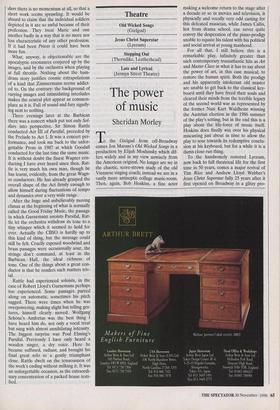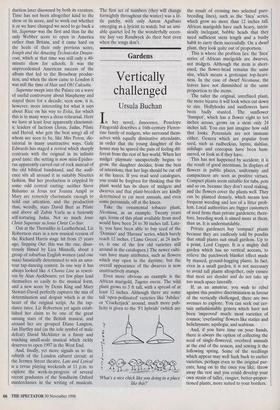Theatre
Old Wicked Songs (Gielgud) Jesus Christ Superstar (Lyceum) Stepping Out (Thorndike, Leatherhead) Late and Lyrical (Jermyn Street Theatre)
The power of music
Sheridan Morley
Tthe Gielgud from off-Broadway comes Jon Marans's Old Wicked Songs in a production by Elijah Moshinsky which dif- fers widely and in my view unwisely from the American original. No longer are we in the chaotic, score-strewn study of the old Viennese singing coach; instead we are in a vastly more antiseptic college music-room. Then, again, Bob Hoskins, a fine actor making a welcome return to the stage after a decade or so in movies and television, is physically and vocally very odd casting for this defeated musician, while James CaIlis, hot from drama school, can never quite convey the desperation of the piano-prodigy unable to equate his talent with his political and social arrival at young manhood.
For all that, I still believe this is a remarkable play, infinitely greater than such contemporary transatlantic hits as Art and Master Class in what it has to say about the power of art, in this case musical, to restore the human spirit. Both the prodigy and his apparently intolerant old master are unable to get back to the classical key- board until they have freed their souls and cleared their minds from the terrible legacy of the second world war as represented by the former Nazi Kurt Waldheim winning the Austrian election in the 1986 summer of the play's setting; but in the end this is a play about the life-force of music itself. Hoskins does finally win over his physical miscasting just about in time to allow the play to soar towards its redemptive conclu- sion at his keyboard, but for a while it is a damn close-run thing.
To the handsomely restored Lyceum, now back to full theatrical life for the first time in 50 years, comes a major revival of Tim Rice and Andrew Lloyd Webber's Jesus Christ Superstar fully 25 years after it first opened on Broadway in a glitzy pro- duction later disowned by both its creators. Time has not been altogether kind to the show or its score, and to work out whether it or we have changed we need to go back a bit. Superstar was the first and thus far the only Webber score to open in America rather than Britain, and it came hard on the heels of their only previous score, Joseph and the Amazing Technicolor Dream- coat, which at that time was still only a 40- minute show for schools. It was the unprecedented American success of the album that led to the Broadway produc- tion, and when the show came to London it was still the time of Hair and Oh! Calcutta.
Superstar swept into the Palace on a wave of useful controversy about blasphemy and stayed there for a decade; seen now, it is, however, more interesting for what it says about Rice on his way to Evita, for which this is in many ways a dress rehearsal. Here we have at least four apparently charismat- ic leaders of factions (Jesus, Judas, Pilate and Herod, who gets the best song) all of whom are seen to be, like Mrs Peron, dic- tatorial in many unattractive ways. Gale Edwards has staged a revival which sharply contrasts with the original in its infinite good taste: the setting is now mini-Epidau- rus apparently carved out of rock instead of the old biblical bandstand, and the audi- ence sits all around it in suitably Nineties fashion. But her production is crippled by some odd central casting: neither Steve Balsamo as Jesus nor Joanna Ampil as Mary are remotely charismatic enough to hold our attention, and the production thus, weirdly, stars David Burt as Pilate and above all Zubin Varla as a furiously self-torturing Judas. Not so much Jesus Christ Superstar as Jesus Christ Co-Star.
Out at the Thomdike in Leatherhead, Liz Robertson stars in a new musical version of the Richard Harris stage hit from 15 years ago, Stepping Out: this was the one, disas- trously filmed by Liza Minnelli, about a group of suburban English women (and one man) fanatically determined to win an ama- teur tap-dancing contest. In one way it has always looked like A Chorus Line as rewrit- ten by Alan Ayckboum; yet few plays lend themselves so easily to the musical form, and a new score by Denis King and Mary Stewart-David perfectly captures the mix of determination and despair which is at the heart of the original script. As the tap- dance tutor, Liz Robertson yet again estab- lished her claim to be one of the great unsung stars of the British musical, and around her are grouped Diane Langton, Jan Hartley and (as the sole symbol of male defeat) David McAlister in a funny and touching small-scale musical which richly deserves to open 1997 in the West End.
And, finally, yet more signals as to the rebirth of the London cabaret circuit: at the Jermyn Street theatre, Late and Lyrical is a revue playing weekends at 11 p.m. to explore the work-in-progress of several recent graduates of the Sondheim Oxford masterclasses in the writing of musicals. The first set of numbers (they will change fortnightly throughout the winter) was a lit- tle patchy, with only Anton Agalbato emerging as a lyricist to watch; but an ami- able quartet led by the wonderfully eccen- tric Issy van Randwyck do their best even when the songs don't.



















































































 Previous page
Previous page